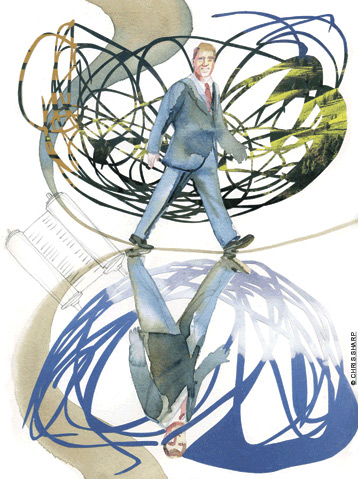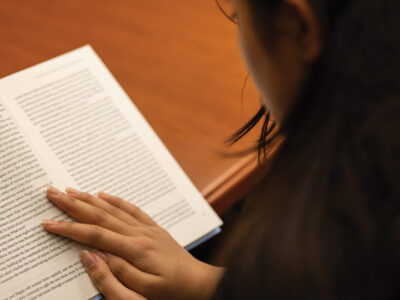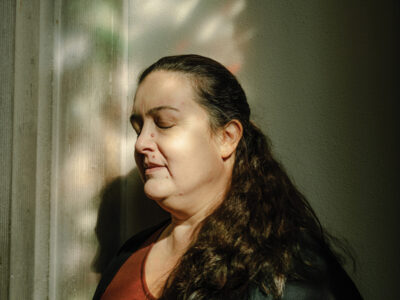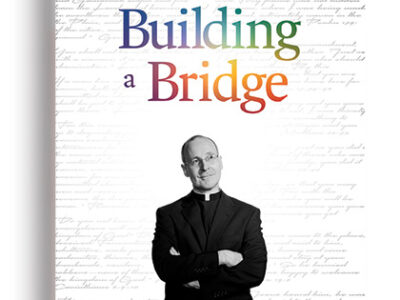
With his appointment as chancellor of New York’s Jewish Theological Seminary, the noted religious-studies scholar—and one time Gazette student columnist and assistant to former Penn President Martin Meyerson—is only the second non-rabbi to serve as the symbolic head of American Judaism’s Conservative movement.
By Jordana Horn | Illustration by Chris Sharp
It was one of those moments, in hindsight, when it would have been great to have been a fly on the wall.
The interviewee on the day in question in 1971 at New York’s Jewish Theological Seminary (JTS) was Rabbi Abraham Joshua Heschel, the seminal thinker and philosopher who redefined the Conservative movement. A prominent anti-war and civil-rights activist, Heschel had not only shaped the intellectual landscape of the Conservative movement, but breathed new life into the concept of the Jewish responsibility to be actively engaged with social issues.
The interviewer was Arnold Eisen C’73, then a Daily Pennsylvanian reporter who was writing a feature for 34th Street Magazine on Heschel. Eisen was a religious-studies major, a Conservative Jew, and a young man who knew the significance of the personage he was about to interview, but wasn’t afraid to ask him tough questions.
Eisen credits that interview with changing the course of his life.
“Heschel understood, within five minutes of our conversation, that I had deeply personal concerns on my mind, and that he was speaking to someone who was considering being a serious Jew,” Eisen recalls, recounting how he asked Heschel “challenging questions which he could have dismissed as simply the arrogance of a 20-year-old.
“I asked him, ‘What good is all your protesting the war doing anybody?’ Where did I get the arrogance to say to such a man that religion had become oppressive and overly sentimental?” Eisen wonders. “He responded very seriously for a few hours. He was fully present, and I left the room transformed.”
Transformed, indeed. A bit more than 35 years later, Eisen is preparing to go through the doorway of the JTS again—but this time as its chancellor, the titular head of the institution and the symbolic head of the Conservative movement. Having been named to the post in April 2006, he will officially take office this July, relocating from California to New York with his wife, Adriane Leveen, a senior lecturer in the Hebrew Bible at Stanford University, after his son Nathaniel finishes his senior year of high school. (Eisen and Leveen also have a daughter, Shulie, who is an undergraduate at Brandeis University.)
The news of his election attracted much notice, since he was only the second non-rabbi to lead the 120-year-old training ground for Conservative rabbis. In fact, for Eisen, a scholar and former chair of the Department of Religious Studies at Stanford, to be chosen for a position which has been considered by some to be a de facto chief rabbinate of the Conservative movement, signals nothing short of a revolution in the institution’s approach to halacha, or Jewish law.
The new approach is being warmly welcomed in many quarters. Rabbi Amy Eilberg, the first woman rabbi ordained by the Jewish Theological Seminary in 1985, said, “I believe that Professor Eisen has the giftedness, expertise, and fresh perspective to re-invigorate the discourse that guides the life of our movement.” And, if one can tell a person by the company he keeps, one might regard it as a portent of left-leaning to come that one of Eisen’s closest friends is Rabbi David Ellenson, president of the Reform movement’s seminary. Ellenson professionally applauded Eisen’s selection, saying that the appointment “marks a wonderful day for the Conservative movement worldwide and for American Judaism as a whole.”
Other figures in Conservative Judaism, however, greeted news of Eisen’s appointment with trepidation, if not dismay. “I think that a huge taboo was broken with it not being a rabbi,” said one congregational rabbi from New York, who asked not to be named, in an interview with the Jewish Telegraphic Agency, an international news service. “I’m a little concerned that it’ll be hard to put that genie back in the bottle.” Other anonymous pulpit rabbis voiced their concerns, in the press and blogosphere, that a “statement” was being made by the Conservative movement about the relevance of the rabbi in public life. Or, as JTS blogger Shmuel Rosner posited: “[T]ough questions arise from this choice. The first and most important one is: Where have all the rabbis gone? Aren’t there any good enough rabbis to take on such a job?”
The time of the revolution is at hand. With the numbers of Conservative Jews diminishing as its more religious members migrate towards Orthodoxy and its less tradition-minded slip towards the Reform movement or assimilate entirely, the center is no longer holding. It is a crucial time for the movement, and a time in which Conservative Judaism is revisiting what it means to be a Conservative Jew in the 21st century.
Eisen believes that he is the right person at the right time and the right place. “I’m hoping that my perspective as a relative outsider, but as a scholar of American Judaism, is going to help people see strengths that they might not have appreciated otherwise,” he says. “JTS is a marvelous institution, and the Conservative movement has incredible resources. It may take an outsider to remind them of just how strong they—just how strong we—are.”
Growing up in the suburbs of Philadelphia, Eisen became a bar mitzvah at the Conservative synagogue Temple Emanu-El in Oak Lane, Pennsylvania, where his father was president of the Men’s Club and his family were active congregants. “My entire intellectual and spiritual formation was in the Conservative movement,” Eisen says. Most of his important Jewish influences were Conservative, such as rabbis—whether his own or his teachers in the high-school department of Gratz College, a Philadelphia-area transdenominational college of Jewish studies. He was also an active participant in United Synagogue Youth, the youth group of the Conservative movement.
Even as a teenager, however, Eisen picked up on a diminishing intellectualism in the Conservative ranks. “I did see a contrast between the vitality of the Jewish past that I was studying at Gratz and the present,” he says. “A lot went on around me that didn’t seem as vital. There was a certain amount of mediocrity.
“Something happened to religion in the modern world, which moved it from the center of people’s lives to the periphery,” he adds. “It was a set of changes that I only began to understand when I studied [German sociologist] Max Weber at Penn.” A graduate of Central High School, Eisen received a Mayor’s Scholarship and chose to attend the University.
In his description of his own time at Penn, Eisen wholeheartedly acknowledges that, while he always found religion academically interesting, his Judaism was spiritually peripheral to his undergraduate experience. While he attended services at Hillel at the beginning of his freshman year, he became involved in other activities and left Hillel behind. Like many before and after him, he found himself sucked into the offices of The Daily Pennsylvanian, where he worked many evenings and late nights as a writer and, later, an editor. He also was one of the first student columnists for the Gazette, and spent a summer writing for what was then called the University News Bureau on the fifth floor of the Franklin Building with fellow student (and Gazette student columnist) Phyllis Kaniss CW’72, a former assistant dean at the Annenberg School for Communication and director of the Annenberg Public Policy Center’s Student Voices Project who is now the executive director of the American Academy of Political and Social Science, based at the Fels Institute of Government at Penn.
“I remember that Arnie and I befriended Penn people together, and somehow managed to get ourselves invited out to lunches at La Terrasse or dinner at people’s houses, and we were generally treated better than we probably deserved,” Kaniss says. “And part of it was that Arnie was such a great conversationalist that people just enjoyed hosting him—and, I guess, incidentally, me.”
Last fall, Kaniss went to hear Eisen speak at a Philadelphia synagogue, and was delighted at how little her former co-worker had changed. In addition to retaining his youthful demeanor, she says, “his personality was just as I had remembered it from Penn. He still had that combination of sharp intelligence, humor, great warmth, humility, and just plain niceness. He was making such interesting and original points about modern Judaism, but it all seemed to come from someone who seemed very much like ‘Everyman,’ and in some ways his argument was so much more persuasive because of that very down-to-earth approach.”
Academically, Eisen’s interest in Judaism flourished at Penn, as he worked on an individualized major in contemporary religious thought in a social and intellectual framework. “The great gift of the University was that it helped me to understand what had happened to Judaism in an academic context,” Eisen said. He studied with Professor Van Harvey, who for many years was a leading figure in Penn’s Department of Religious Studies, and who later would bring Eisen to Stanford after moving to the faculty there.
Eisen’s undergraduate coursework laid a foundation for his future scholarship; meanwhile, his extracurricular activities were giving him a virtual apprenticeship in running a large academic institution. In addition to his work for the DP and the Gazette, Eisen was involved in the Student Committee on Undergraduate Education (SCUE). Then, during Eisen’s junior and senior years at the University, he served as one of two student assistants in the office of then-University President Martin Meyerson Hon’70—a stint which, although Eisen didn’t know it at the time, would give him a sneak preview of his future role as JTS chancellor.
“I never knew that my activity for SCUE would lead me to work in the president’s office, which would kindle a spark years later that would lead me to accept the chancellor job at JTS,” Eisen says. “It was a love of universities and what they are all about—thinking about the university as an institution—which is playing itself out in becoming chancellor.”

From his time in the president’s office, Eisen recalls many faculty meetings, work on vision statements and speeches—and “endless” conversations with Meyerson. “Conversation partner was one of my major roles,” Eisen laughs. “He is one of the greatest intellectuals I have known in my time.”
Dr. Renée Fox, the Annenberg Professor Emerita of Sociology, who worked with Eisen in Meyerson’s office as a faculty representative, remembers Eisen as “unusually mature” and “intellectually brilliant.”
“He was always an excellent writer, and was obviously a man of faith, but one who was both a questioning and questing person,” Fox says. “He was strongly anchored in tradition and faith, but was very open-minded.”
Flipping the usual student-faculty dynamic on its head, Eisen invited Fox, as well as other faculty, to his family’s home for meals. “It was sort of a role-reversal—they received me, rather than the other way around.” Fox laughs. “But he always was willing to open his personal life to others in that way. He’s a very kind and compassionate person.”
Eisen received the University’s Thouron scholarship and went on to study at Oxford for two years. “I fully expected that I’d come back and be a journalist,” Eisen confesses. “I got bitten by the academic bug. I realized that I could engage in the study of Judaism.” He subsequently attended Hebrew University in Jerusalem, where he received his Ph.D.
“I regard myself as a kid who grew up at the University of Pennsylvania,” Eisen sums up. “It opened up the world to me. From there to Oxford, to Hebrew University—Penn really did its job.”
In the years since, Eisen has literally written the book on modern American Judaism, several times over. His books—among them Rethinking Modern Judaism: Ritual, Commandment, Community; Taking Hold of Torah: Jewish Commitment and Community in America; and Galut: Modern Jewish Reflection on Homelessness and Homecoming—focus on the complexities and changes inherent in contemporary Jewish life. The Jew Within: Self, Family and Community in America, co-authored with sociologist Steven M. Cohen, examines the definition of Judaism as it applies to contemporary American Jews.
The reception of his books has been overwhelmingly positive. Rethinking Modern Judaism garnered Eisen a National Jewish Book Award in 1999, and the influential Jewish magazine Tikkun called it “fascinating,” and “an insightful entrance point to understanding the evolution of the theologies of America’s largest Jewish denominations.”
The direct relevance of his scholarship, Eisen himself contends, renders him a tailor-made fit for the position of chancellor. “I wouldn’t make the case for a scholar, in general, to hold this position, but a scholar who first of all has always had contemporary American Judaism as his subject—that kind of scholar”—Eisen pauses—“me, I can certainly make a case for.
“A rabbi could do an excellent job, and there are many who I would have chosen. But they didn’t simply choose a non-rabbi. I’m an active Conservative Jew, who is passionate about contemporary Jewish life.”
Additionally, Eisen notes, the seminary is itself first and foremost an academic institution, an intellectual training ground for young rabbis preparing to put theories into practice. “I’m trying to maintain that scholarship as I help the seminary do what I try to do personally—to bring the scholarship to bear on the issues of the day. It’s an exciting time for American Judaism.”
In conversation, Eisen comes across as almost relentlessly upbeat, seeing revitalization where others see potential demise. “You often hear about the decline in numbers of the American Jewish population,” Eisen says. “The numbers of people who belong to synagogues, the numbers of Jews who identify as Jews—these numbers are going down.
“But at the same time, there’s an incredible amount of experimentation and transformation going on in Jewish life today,” he adds. He illustrates his conceptual picture enthusiastically, enumerating examples within the American Conservative Jewish community: Day-school enrollments are on the rise, Jewish camping and Jewish-studies programs are flourishing, and feminism has made real inroads into Jewish life. He points out that an increase in the “quality” of involved congregants could compensate for the decline in quantity. In other words, the glass may well be half empty—but what’s left in the glass is top-shelf champagne.
Eisen also envisions a future for Conservative Judaism—for all denominations of Judaism, for that matter—in which congregants fine-tune their observance as befits their own personal wants and needs. “I think that people are always going to need institutions that have a certain character which fits their aspirations, their particular styles of being Jewish, and their degree of attachment to Jewish law,” Eisen says. “I don’t think we’re going to see an end to Orthodox, Conservative, or Reform Judaism.”
That being said, Eisen adds, “What’s relevant to a Conservative synagogue is going to be relevant to a Reform or Orthodox synagogue. On the other hand, there are certain things that are going to differentiate them. What is the role of women going to be? Full egalitarianism? That’s outside the realm of Orthodox Judaism. A great deal of Hebrew? That’s outside the realm of Reform Judaism. There are going to be specifics that immediately come into play when you start making choices.”
Such choices are the lines drawn in the sand between the movements of Jewish observance—and the time to draw and erase such lines is drawing nearer. In December, in a hotly contested vote, the Conservative movement’s Rabbinical Assembly ruled that the the ordination of gay and lesbian rabbis was permissible under Jewish law.
While the JTS chancellor had no official decision-making capability on such issues, the position certainly wields a degree of influence, and Eisen had made it clear that he would like to see gay and lesbian rabbis in the Conservative movement, a change from the movement’s prior stance on the issue. It’s a big, decisive stand, and Eisen is not only comfortable with it, but believes that it would make the Conservative movement a more comfortable and inclusive entity as a whole.
“It’s hard to tell what the impact will be, except that many people who currently do not feel welcome in the synagogue will be made to feel welcome by these role models,” Eisen says. He cites the example of JTS’s decision to ordain women in 1985: “All sorts of women are feeling connected to Jewish life right now, expressing this connection because of the female rabbis they’ve had as role models. There’s been the creation of new rituals and new liturgy—it’s one of the great gifts to Judaism in my generation.”
The issue of whether or not to sanction religious marriages between gays and lesbians is not currently on the table, but the assembly also voted to allow same-sex commitment ceremonies. “You already see a lot of Conservative rabbis doing some form of commitment ceremony,” Eisen says, “and I think that trend will grow.”
Within the synagogue, Eisen forecasts a future of re-anchoring the Conservative community in ritual and belief. Traditionally, he says, the synagogue always served three functions in Jewish communities throughout the Diaspora: a house of prayer, a house of study, and a house of assembly—it is only in America that the synagogue has been fashioned as a purely religious institution.
“You have synagogues thriving as houses of worship because prayer services have been revitalized,” Eisen says. “But synagogues are also houses of study and assembly. We know from my research and others that people want and seek community—you need to give them religious meaning in the context of community. If you do, they will respond positively and come back for more. Study opens up dimensions to you that you’ve never seen before.”
As a scholar of religion, Eisen has been repeatedly struck by the unique properties of America and how they affect community life. “The revival of churches has a lot to teach Jews about the revival of synagogues,” he says. Similarly, there is a lesson to be learned by Judaism by the growth of Latino immigrants and Spanish-speaking populations with a high degree of bilingualism: a bilingualism which, Eisen feels, would do well to be emulated by the American Jewish community.
“Somehow, Jews all over the world except America manage to learn Hebrew,” Eisen explains. “It’s so important to have Jews feel comfortable in the language Jews have had over the centuries—to have the experience of picking up the Torah and reading in the original Hebrew, and to understand—not do anything by rote, but rather to enter into the intention of the prayer.
“The thrill of being able to hear the Ten Commandments in Hebrew and to understand is tremendous,” Eisen adds. “The ability to become an interpreter of your own tradition is precious.”
Where does Eisen see Conservative Judaism in America, say, 50 years from now? His greatest fear, he says, is that the number of observant Jews in America will have dwindled, creating an inability to fund and supply the institutions needed to preserve the tradition—institutions much like JTS. At the end of the day, Eisen admits, to a certain extent, the numbers do matter.
“What happens 50 years from now depends on the work of identity building that we do now,” he says. “That’s why it’s crucial that we take advantage of this moment, when we have the resources and a moment of real vitality and pluralism to act.
“My hope is that Conservative Jews and other Jews alike will be finding new ways to recreate their Jewish identities,” Eisen adds. “Jewish life is very interesting, for those who want to take advantage of it. Each generation can find ways to keep the project alive. That’s what I want to be part of.”
Jordana Horn C’95 L’99, a lawyer and writer, last wrote on Penn alumni involved in New York City politics in the Jan/Feb 2006 issue of the magazine.




